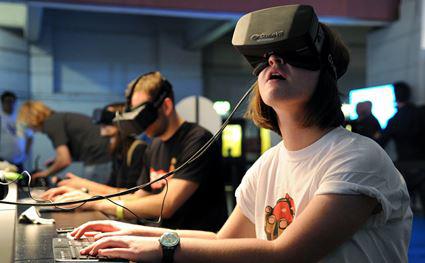
On Friday morning, my cohort at Startup Institute had a fireside chat with Aaron Nicholson, who is involved in the growing industry of virtual reality, or VR.
Now obviously, since this person was invested in the development of VR, he had a lot to say about the ways virtual reality can be used in gaming, film, health, psychology, and other such fields.
And, even having not experienced the Samsung virtual reality goggles that were passed around, I could see how this was intriguing technology, an extension of something we’ve tried to achieve for years with books, with film and games, 3-D Imax films, theme park rides – an immersive experience in another world.
And yet, there was a niggling in the back of my head – a scene from the novel Fahrenheit 451.

I first read Fahrenheit 451 nine years ago this month (which is SUCH a strange thought). I was away from home for the first time at a choral studies camp in middle-of-nowhere upstate New York, and it was required reading for school, which I figured I would get through while I was waiting for Harry Potter and the Deathly Hallows to be released.
The 1950s novel of a “near future” America where books are burned drew me in. I loved his wonderful and thoughtful language, the clear love of books spilled onto the page, the growth of rogue book burner Guy Montag, and the soul, wit, and heart of Clarisse McClellan.
What also stayed with me were the negative images, the worries and warnings science fiction often meditates on, especially in modern dystopias. The world of Fahreheit 451 is a lot closer to home than The Hunger Games or The Maze Runner, however, in that the society is quite recognizable. Robotic hounds, wall-sized TV screens, a tiny radio you can put in your ear – much of this tech is either close to existing or already there.
The scene I was thinking of, in this instance, had to do with the wall-sized television screens, called “parlor walls,” the intent being to eventually have enough money for four parlor walls, making the room an immersive TV parlor, which is what the main character’s wife, Mildred, wishes to do.
She calls the characters on her screens “family,” and even, at the top of the novel, participates in a play that comes on the “wall-to-wall circuit,” with the intent that one part is written out and Mildred can read a script and “interact” with the characters.
Are you starting to see why the concept of virtual reality made me think of this? Made me worry about this?
